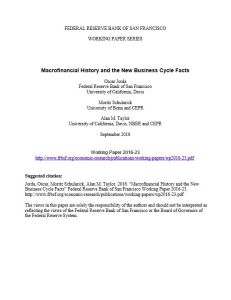Join getAbstract to access the summary!

Join getAbstract to access the summary!
Oscar Jorda, Moritz Schularick and Alan M. Taylor
Macrofinancial History and the New Business Cycle Facts
FRBSF, 2016
What's inside?
New data show that highly leveraged economies experience less frequent but more destructive crashes.
Recommendation
In this innovative research that relies on new global data, economists Oscar Jorda, Moritz Schularick and Alan M. Taylor document the impacts of the remarkable rise in leverage in advanced nations since the 1970s. That increase in indebtedness has left its marks on these economies through slightly reduced volatility and slower growth, greater risk of extreme events, and closer synchronies between business and financial cycles than before. This groundbreaking analysis confirms that significant increases in leverage might not impair an economy’s ability to manage small-scale downturns but are likely to leave it at greater risk of rarer but far more damaging crashes. getAbstract recommends this scholarly study to officials, economists and historians for its contributions to the study of macroeconomic stability.
Summary
About the Authors
Oscar Jorda is an economist with the Federal Reserve Bank of San Francisco. Moritz Schularick is an economics professor at the University of Bonn. Alan M. Taylor is an economics and finance professor at the University of California, Davis.



















Comment on this summary